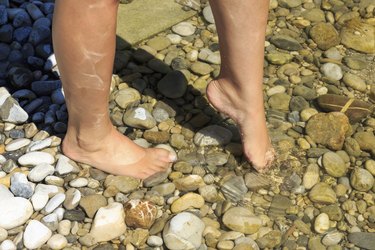
The next time you're trekking along a cobblestone street, take heart that the uneven terrain is actually a boon to your own fitness. If you kick off your sandals, your feet and body will get an even better workout. The uneven surfaces of stone paths are commonly used for wellness as "reflexology paths," although you can get the same beneficial effects from any uneven stone pathway.
Lowering Blood Pressure
Video of the Day
According to a 2005 study published in the "Journal of the American Geriatrics Society," older adults who regularly walked on cobblestone surfaces displayed lower blood pressure readings than those who walked on regular surfaces or engaged in no physical activity. The study did not differentiate between walking with or without shoes. Differences were apparent after 16 weeks of regular exercise, with three hours of walking per week.
Video of the Day
Improving Overall Fitness
The same study that found lower blood pressure among those who walked on cobblestones also noticed a significant improvement in overall mental and physical fitness. Participants in the study who had walked on uneven surfaces over 16 weeks received better physical and mental health scores. In addition to the objective fitness scores, the participants' subjective assessments of their own fitness improved more among those who had walked on the uneven surfaces.
Stimulating Reflex Points
Reflexology is a healing art based on the stimulation of specific points on the feet, hands and ears. According to its tenets, certain points on the extremities are connected to organs and other parts through the body. Most reflexology work is based on the stimulation of specific points by hand, with qualified reflexologists learning the complex reflex maps and working in the style of a masseuse to stimulate specific points on a patient. However, the principles of reflexology have also been applied to reflexology paths, which are essentially cobblestone walkways of varied textures. Walking along one of these paths stimulates the reflex points in the feet, balancing the body's energetic flow. The paths are more common in Asia than in the west, though western parks and schools such as Bastyr University are installing them, as interest in reflexology spreads.
Working Foot Muscles
Just by walking barefoot, you're already giving your foot a more thorough workout than if you'd stayed in your loafers. According to a study published in podiatry journal "The Foot" in 2007, people's feet become less healthy, the more they wear shoes. The study compared the feet of Sotho, Zulu and European people, looking at both modern examples and the feet of 2,000-year-old skeletons. The investigation found that modern Europeans, those who wore shoes the most often, had the unhealthiest feet of any group. If you walk barefoot on cobblestones, you give your feet the opportunity to use the full set of muscles involved in a natural human stride, rolling from a gentle heel strike into a push-off with the toes.